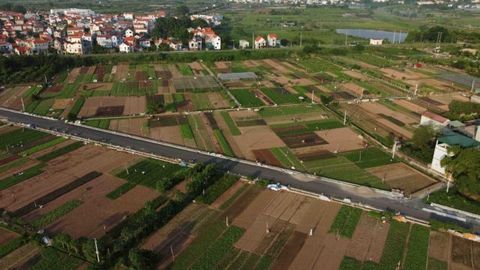
Safe vegetable products of Tiền Lệ Agricultural Cooperative in Tiền Yên Commune, Hoài Đức District, Hà Nội. —VNA/VNS Photos Vũ Sinh
The capital city of Hà Nội has focused on building linkage chains from production to consumption to stabilise the prices of agricultural products, improve the value of those products and control food safety, according to the Hà Nội Department of Agriculture and Rural Development.
According to Nguyễn Thị Thu Hằng, head of the Hà Nội Agricultural, Forestry and Fisheries Quality Control Sub-Department, building the production and supply chains for agricultural products plays an important role in the development of agricultural production.
Hà Nội has 159 chains linking production and consumption, including 53 chains of animal products and 106 chains of plant products.
The chains have attracted the participation of many businesses, cooperatives, and farming households. There are many closed chains from production to consumption, creating strong brands in the market, such as Bảo Minh rice, Chúc Sơn safe vegetables, Hoàng Long pork, and Kinoko mushrooms.
The capital city has also signed cooperation agreements with 43 provinces and cities to develop more than 900 chains linking from production to consumption, supporting trade promotion and consumption of agricultural products and regional specialities in the Hà Nội market.
The chains have contributed to stabilising output, adapting to market demand, reducing oversupply, and limiting losses for farmers.
They also create conditions for functional agencies to control the origin of agricultural products in the market.
Besides that, many businesses and cooperatives have promoted goods consumption through modern distribution channels, such as supermarkets of Central Group, Aeon and Lotte, contributing to improving product quality and value of Hà Nội's farm produce.
To promote efficiency of those chains, Đặng Đình Tiên, director of Tiên Viên Joint Stock Company in Chương Mỹ District, said that the authorities needed to create conditions for cooperatives to borrow capital at preferential interest rates for expanding production scale, and participate in fairs for introducing products and signing consumption contracts with their partners.

A view of the field cultivating safe vegetables and fruit of Tiền Lệ cooperative.
Hà Nội sets a target that by 2025, all participants in the chains will receive technical training and knowledge about clean agriculture. All chains of production and consumption of safe agricultural and food products must apply information technology for traceability using QR codes.
Nguyễn Ngọc Sơn, deputy Director of the Hà Nội Department of Agriculture and Rural Development, said the department would focus on reviewing enterprises and cooperatives that produce and consume agricultural products and encouraging them to build the linkage chains.
The department would propose the city have supportive mechanisms and policies for the development of infrastructure, equipment and processing factories to complete the linkage chain.
Hà Nội would also apply scientific-technical advances, and achievements of the fourth industrial revolution in production, preliminary processing, packaging, processing and consumption of products to increase the value of agricultural products.
Cao Thị Thủy, head of Đoàn Kết agricultural production and business cooperative in Ứng Hoà District, said the cooperative had successfully built a production and consumption chain of high-quality rice product - Japonica rice.
This cooperative had also cooperated with Châu Anh Ltd, Co, to run nearly 20 rice retail stores in Hà Nội and the provinces of Bắc Ninh, Thái Nguyên, Vĩnh Phúc and Phú Thọ. For each crop, the cooperative sold an average volume of 3,000 tonnes of paddy and 1,000 tonnes of Japonica rice with stable prices.
Meanwhile, Nguyễn Văn Hào, head of Tiền Lệ Agricultural Cooperative in Tiền Yên Commune, Hoài Đức District, said farmers in Tiền Yên Commune focused on producing vegetables and fruits under VietGAP and VietGAP standards and those farm produce had been granted a geographical indication.
The cooperative cooperated with 10 enterprises to consume about 50 per cent of its total output. In addition, it also signed contracts to supply vegetables and fruits for the supermarket chain of Winmart and Big C, and organic vegetable stores.
The cooperative sold about 15-20 tonnes of vegetables on average per day. Thanks to the production under the chain, the output for safe vegetable products of the cooperative was stable, and the price was also 10 per cent higher than that of traditional production. — VNS